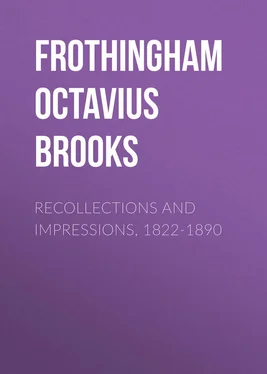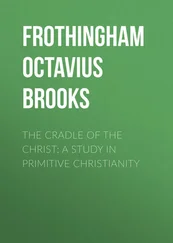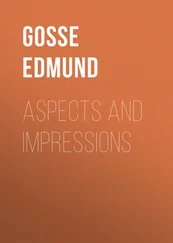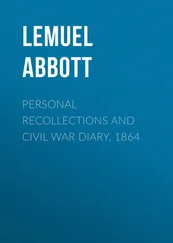Octavius Frothingham - Recollections and Impressions, 1822-1890
Здесь есть возможность читать онлайн «Octavius Frothingham - Recollections and Impressions, 1822-1890» — ознакомительный отрывок электронной книги совершенно бесплатно, а после прочтения отрывка купить полную версию. В некоторых случаях можно слушать аудио, скачать через торрент в формате fb2 и присутствует краткое содержание. Жанр: foreign_antique, foreign_prose, на английском языке. Описание произведения, (предисловие) а так же отзывы посетителей доступны на портале библиотеки ЛибКат.
- Название:Recollections and Impressions, 1822-1890
- Автор:
- Жанр:
- Год:неизвестен
- ISBN:нет данных
- Рейтинг книги:3 / 5. Голосов: 1
-
Избранное:Добавить в избранное
- Отзывы:
-
Ваша оценка:
- 60
- 1
- 2
- 3
- 4
- 5
Recollections and Impressions, 1822-1890: краткое содержание, описание и аннотация
Предлагаем к чтению аннотацию, описание, краткое содержание или предисловие (зависит от того, что написал сам автор книги «Recollections and Impressions, 1822-1890»). Если вы не нашли необходимую информацию о книге — напишите в комментариях, мы постараемся отыскать её.
Recollections and Impressions, 1822-1890 — читать онлайн ознакомительный отрывок
Ниже представлен текст книги, разбитый по страницам. Система сохранения места последней прочитанной страницы, позволяет с удобством читать онлайн бесплатно книгу «Recollections and Impressions, 1822-1890», без необходимости каждый раз заново искать на чём Вы остановились. Поставьте закладку, и сможете в любой момент перейти на страницу, на которой закончили чтение.
Интервал:
Закладка:
A tone of old-fashioned piety pervaded the establishment. A weekly prayer-meeting, always attended by one of the professors, though officially rather than as a stimulator, was much in the manner and spirit of similar exercises at Andover. The students were cautioned against excessive intellectualism. Several of them spent their Sundays in teaching classes of the young in the neighboring towns, in ministering to the sick in hospitals, or in carrying the monitions of conscience to the criminals in the prison at Charlestown. The aims of a practical ministry were thus kept in view as well as the circumstances of the time permitted. Of course the school could not be a philanthropic institution any more than it could be independent or scientific. It was committed to a special purpose, which was the supply of Christian pulpits with instructed, earnest, devoted men. That they should be Unitarians was expected; that they should be Christians in belief was demanded. There were two ever-present spectres, "orthodoxy" and "rationalism," the one represented by Andover, the other by Germany. Audacity of speculation when unaccompanied by practical piety was discountenanced, and in flagrant instances rebuked.
The literal form of the orthodox creed, it need hardly be said, was made more prominent than its imaginative aspect. This was inevitable, for the object was to assail it rather than to understand it. To be perfectly fair to all sides was, under the circumstances, not to be expected at a period so near the era of controversy. An earnest, ingenuous youth could find at Cambridge all the courage and impulse he needed, for the atmosphere of the place was neither chilling nor depressing. The less emotional, more intellectual scholar was left to pursue his studies undisturbed, the wind of spiritual feeling not being strong enough to carry him away.
In a word, the institution was all that could have been looked for in a time when ecclesiastical and doctrinal traditions were fatally though not confessedly broken, and naked individualism was not avowedly adopted. The task of the professors, conscientious, hard working, utterly faithful men, was laborious, difficult, and thankless. The Unitarian public, fearing a tendency to unbelief, gave them a grudging confidence; the students, I am afraid, were not considerate of them, – the zealous finding them lukewarm, the cold-blooded blaming them for stopping short of the last consequences of their own theory. It is wonderful that the school went on at all. The single-minded devotion of the teachers alone preserved it. Looking thoughtfully back across a wide gulf of years, the writer of these pages feels that he owes this tribute to Convers Francis and George R. Noyes. How often he has wished he could take them by the hand and ask their forgiveness for his frequent misjudgment of them, misjudgment the remembrance of which makes his heart bleed the more as he can only think of their generous forbearance. Their influence was emancipating and stimulating. They were friendly to thought. Under their ministration the mind took a leap forward towards the confines of the Christian system of faith. What the divinity school of the future may be able to accomplish it would be hazardous to conjecture. It could hardly then have done more than it did.
The study of comparative religions, so zealously prosecuted within a few years, together with a desire to do perfect justice to orthodox doctrines, may render practical a scientific review of theological systems, but in this event a predilection in favor of a separate "Christian" ministry can be no longer characteristic of a divinity school which proposes to prepare young men for the clerical calling.
The three years of secluded life passed quickly away. The trial sermon in the village church was delivered and criticised. The President of the college then was Edward Everett, my uncle. The next morning I went to his office; he spoke warmly of my sermon, but advised me henceforth to commit sermons to memory as he did. This I tried two or three times, but the effort to write the sermons so fatigued me that the task of committing them to memory was too great, and for years I wrote my discourses, until for convenience' sake I learned to preach without notes. The diploma was bestowed, the actual ministry was begun. The term of preaching as a candidate did not last long. By the advice of friends an invitation was accepted to an old established conservative parish in Salem, Mass. Ordination and marriage soon followed, and public life was inaugurated under the most promising conditions. I had the best wishes of the conservative portion of the community to which I was, properly, supposed to belong, and the hopes of the radical portion who anticipated a change of view as time went on, and I was brought into sharper collision with prevailing habits of thought than was possible at Cambridge, where the student was in a great measure cut off from intercourse with the world.
At the "Divinity School" I was known as a young man with conservative ideas. I remember now discussions, essays, criticisms, in which the opinions in vogue among old-fashioned Unitarians were defended somewhat passionately against the more daring convictions of my companions. In especial my faith was in direct opposition to the spiritual philosophy; Strauss was a horror; Parker was a bugbear; Furness seemed an innovator; Emerson was a "Transcendentalist," a term of immeasurable reproach. All this was soon to pass away, and I was to go a great deal beyond even Parker. The word "Transcendentalist" ceased to be a synonym for "enthusiast." The philosophy of intuition was first literally adopted, then dismissed, and I came out where I least expected. But I well remember, one evening as I was walking out from Boston, presenting to myself distinctly the alternative between the adoption of the old and the new. I am afraid that the old commended itself by its venerableness, the solidity of its traditions, and the authority of its great names, while the new was still vague and formless. I then and there decided to follow in the footsteps of my fathers, a course more in sympathy with the prevailing temper of the age and with the current of thought at Divinity Hall, though Emerson had delivered his address some years before, and the New Jerusalem was even then coming down from heaven.
IV.
SALEM
Old Salem was a city of the imagination. History does it no justice. The "Essex Institute," founded in 1848, by the union of the "Essex County Historical Society" and the "Essex County Natural History Society," has a very fine collection of books, pamphlets, manuscripts, an invaluable museum, relics, pictures, so that in no locality in the country has so much been accomplished in exhuming the treasures of municipal and civil history, and in bringing to light antiquities. Hurd's "History of Essex County," published in 1888, with its monographs on commerce, religion, literature, newspapers, etc., written by thoroughly competent men, throws a flood of light on the past of the place. Mr. Upham's "Memoir of Francis Peabody," published in 1868, gives an admirable account of the literary eminence of the old town. Colonel Higginson's article in Harper's Monthly on "Old Salem's Sea Captains," published in September, 1886, gives something of its romantic character. But best of all as illustrating this feature are the articles written by "Eleanor Putnam" (Mrs. Arlo Bates), and republished after her death under the title of "Old Salem," in 1887. She was about thirty years old when she died; but if she had lived she would have presented the old city in its quaintest aspect. Her love of antiquarian research, her taste, her devotion to Salem qualified her in an eminent degree for her self-appointed task.
There can hardly be a doubt that the origins of the town were religious; that a religious purpose, deep though undefined and undeclared, animated the emigrants before Winthrop. The very name, Salem, the Hebrew for peacefulness, instead of "Naumkeag" (the old Indian name), adopted in 1628, to commemorate the reconciliation between the company of Roger Conant and that of John Endicott, was already suggestive of spiritual qualities. Eminent forms loom up in the distance: Francis Higginson, the first minister of Massachusetts Bay; Roger Williams, whose name is identified with "soul freedom"; Hugh Peters, his opponent. John Endicott was a most imposing figure; hasty, rash, choleric (as was shown by his striking a man in early life), imperious, but brave and bold. He was a stern Puritan, hating popery so much that he cut out the image of the king from the English banner, because it was an image, while at the same time he persecuted the Quakers, because they advocated obedience to the "inner light" and were disturbers of the established peace. But he had sweeter qualities – gentleness, generosity, and kindness. An old scripture (Ecclesiasticus xi., 28) says: "Judge none blessed before his death; for a man shall be known in his children." The descendants of John Endicott are graceful, elegant, refined people, lovely in manners, gentle in disposition. The root of these qualities must have been in the forefather two centuries and a half ago. The intellectual history of the city is very illustrious and began early. A strong intellectual bent characterized the early settlers, who were persons of inquisitive minds, addicted to experiments and enterprises, exceedingly ingenious. Near the middle of the last century there was in existence in Salem a social evening club, composed of eminent cultivated and accomplished citizens. On the evening of Monday, March 31, 1760, a meeting was held at the Tavern House of a Mrs. Pratt for the purpose of "founding in the town of Salem a handsome library of valuable books, apprehending the same may be of considerable use and benefit under proper regulations." The books imported, given, or bought, amounted to four hundred and fifteen volumes. This society, which may be regarded as the foundation of all the institutions and agencies established in this place to promote intellectual culture, was incorporated in 1797. In 1766, the famous Count Rumford was an apprentice here. In 1781, Richard Kirwan, LL.D., of Dublin, an eminent philosopher of the period, had a valuable library in a vessel which was captured by an American private armed ship and brought into Beverly as a prize. The books were given by Dr. Kirwan, who would accept no gratuity and was delighted that his volumes were put to so good a use. The books were sold to an association of gentlemen in Salem and its neighborhood, and formed the "Philosophical Library." This and the "Social Library" were afterwards consolidated into the "Salem Athenæum," which was incorporated in March, 1810.
Читать дальшеИнтервал:
Закладка:
Похожие книги на «Recollections and Impressions, 1822-1890»
Представляем Вашему вниманию похожие книги на «Recollections and Impressions, 1822-1890» списком для выбора. Мы отобрали схожую по названию и смыслу литературу в надежде предоставить читателям больше вариантов отыскать новые, интересные, ещё непрочитанные произведения.
Обсуждение, отзывы о книге «Recollections and Impressions, 1822-1890» и просто собственные мнения читателей. Оставьте ваши комментарии, напишите, что Вы думаете о произведении, его смысле или главных героях. Укажите что конкретно понравилось, а что нет, и почему Вы так считаете.












